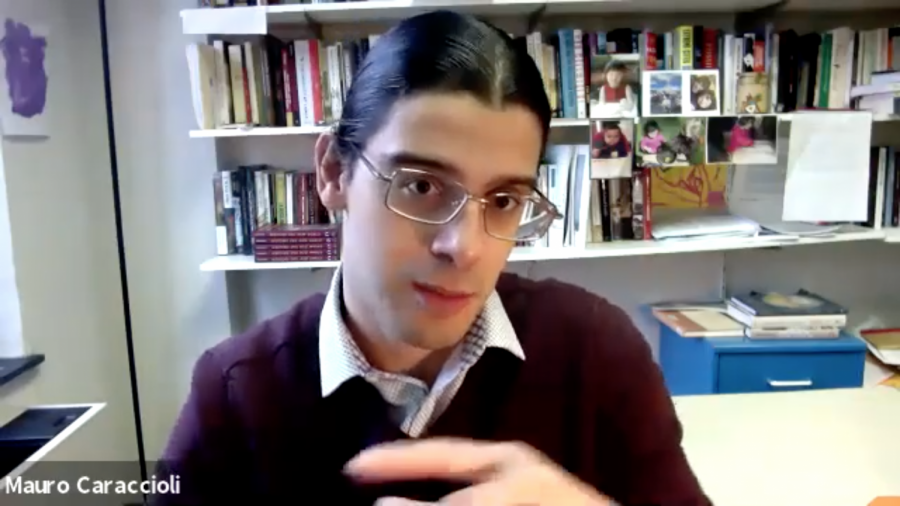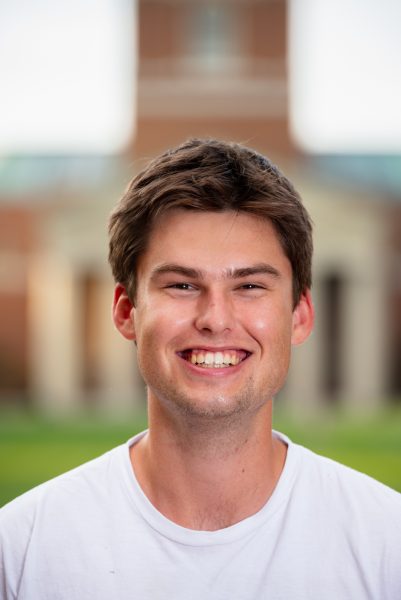New politics class receives NEH grant money
Dr. Jack Amoureux’s New Ideas on Imperialism class received a collaborative humanities grant
Amoureux’s class model involves inviting the authors of class readings to speak over Zoom so that students can ask questions related to the readings.
April 29, 2021
As teachers and instructors across the globe struggle to properly engage their students through their computer screens, Professor Jack Amoureux had a new idea for his Special Topics in Politics course. Amoureux is teaching New Ideas on Imperialism for the first time and didn’t want to simply assign readings like a typical class. His ingenuitive plan? Invite the authors of each book to speak to the class and have groups plan for, transcribe and then publish the discussions.
“Normally in a classroom, you are just wondering out loud about these questions that you want to ask the author,” Amoureux said. “Well, here you get to ask the author. And then the author, in a way, gets to update what they’ve done with the book — like ‘what happened last week, last month, or last year?’ They get to talk about the implications of their book for these major events that are significant to us.”
The four authors, each of whom Amoureux had worked beside on panels with, wrote about imperialism in the typical sense: Spain at the height of its colonialism, imperialism’s effect on modern-day Britain with Brexit or even American militarization. Also included were the nuanced ways imperialism seeps into modern life. Topics examined included energy, the working class and the natural world.
“I wanted to bring some kind of variation,” Amoureux said. “Because no matter why you are taking the class, one of the topics is likely to be of interest to you if you enjoy talking about politics.”
Groups within the class were assigned to each author and tasked to generate questions and interview them. Using the transcription service Descript, the groups have been transcribing the interviews, cutting them down and readying them for publication on an international relations blog. Some groups have podcasts and video clips to upload. Unfortunately, this project came with a price tag, and Amoureux needed to find a way to pay for all of it.
At the beginning of the semester, Amoureux and his students collectively applied for a Faculty-Student Collaborative Humanities Research Grant from the Humanities Institute of Wake Forest, which is funded by a multi-year grant awarded to the university from the National Endowment for the Humanities (NEH).
“One way this was unusual was that me and all of my students applied for the grant,” Amoureux said. “Normally, it might just be a professor and one or two students working together, but we are bringing research and teaching all together.”
The $1,686 grant was used to compensate the authors for their time, to subscribe to the transcription service and to use media images. At the time of writing, not every transcription has been completed, and they most likely will not be done by the time grades are due May 16, so Amoureux has recruited a few students to remain on board with the project after the semester ends.
“One conversation I am looking forward to having with my students is, ‘what does this project look like in the future?’ Amoureux said. “And I already have talked to some like [junior] Hannah [Coates] and [junior] Katherine Finch, who has her own podcast.”
“Originally I wasn’t going to do a podcast as part of the project — I was just going to do the interviews and the video clips,” Amoureux continued. “But because of Finch’s involvement and the class’s enthusiasm for it, we decided to produce these podcasts. These podcasts are part of a series called ‘Eyes on Imperialism’.”
One thing that Amoureux emphasized was the uniqueness of this type of class format. He does not know of any other course-based research projects currently happening on campus, but he hopes that will change in the future.
“One of the things we are trying to do is provide some kind of example, how other classes could do this, how other faculty in other departments could do something similar,” Amoureux said. “The next step of the process is to figure out how to share our experience with others who might be inspired to do something similar.”
Amoureux will be teaching this class in the spring semester of the next school year with a new group of authors and will apply for another humanities grant to continue the interviewing and publication process.























